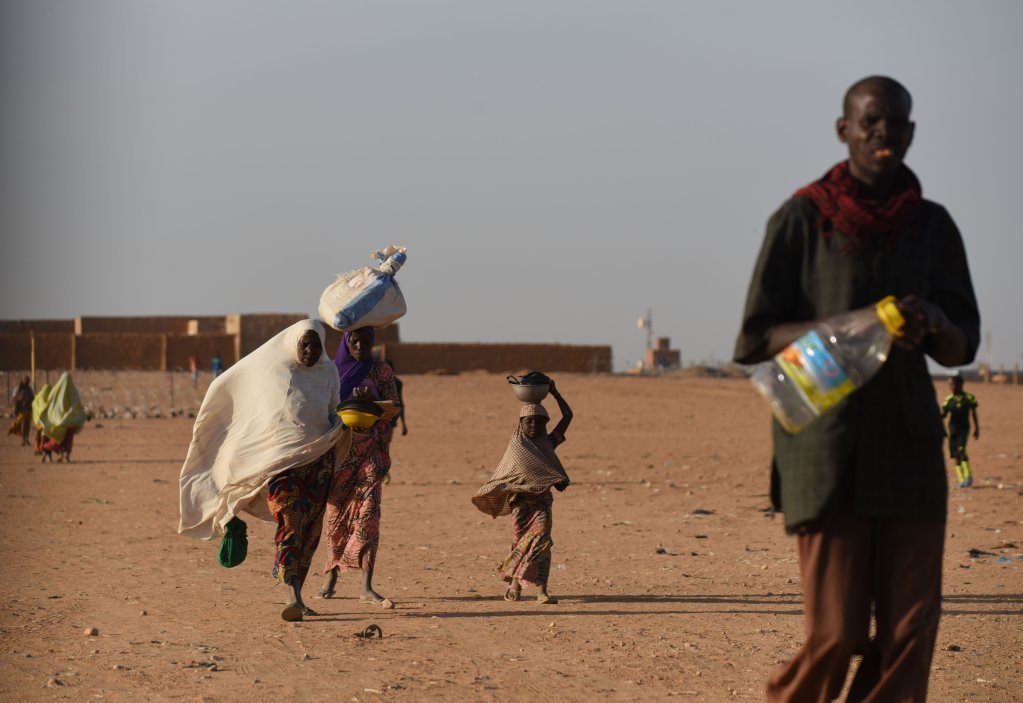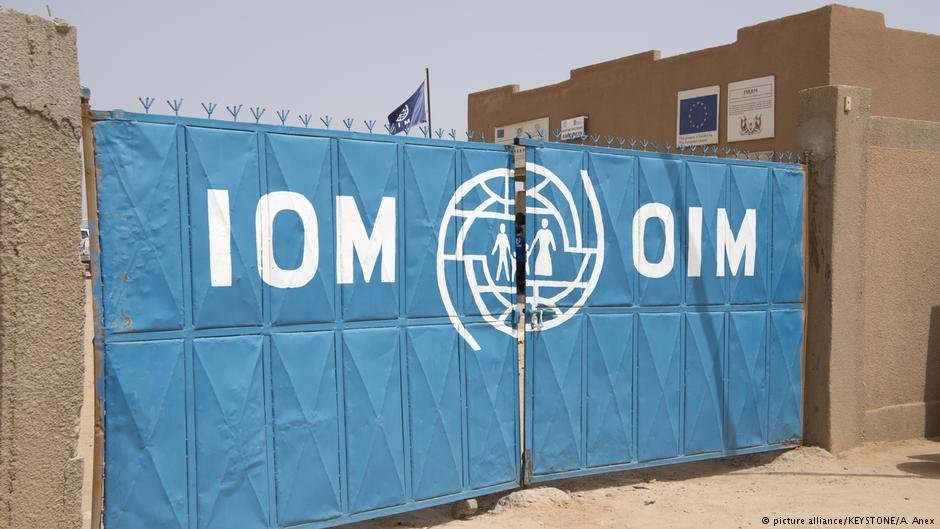Tensions are running high at the UNHCR center in the Nigerien city Agadez. Around 1,900 migrants, refugees and asylum seekers are protesting their living conditions and demanding resettlement. In February, the suspension of food stamp distribution exacerbated the situation, and led to arrests.
For months, the 1,900 migrants staying at the United Nations High Commissioner for Refugees (UNHCR) center in Agadez have protested their living conditions and demanding their resettlement elsewhere in Niger—or in a third country. The suspension of food stamp distribution in February and the arrest of eight residents last week have exacerbated an already tense situation.
People have been protesting daily for 194 days—just over six months. Every day since September 2024, dozens of women, men, and children have held signs demanding to leave the Agadez refugee center in Niger, where they are being held. The photos and videos are then shared on social media, the only way they have found to make their voices heard.
"We don't want to stay here. We're happy to go anywhere, but not in Agadez," Armelle*, a Cameroonian woman in her thirties, told InfoMigrants. This mother has been living in the UNHCR humanitarian center located about fifteen kilometers from Agadez, in northern Niger, for four years.
Approximately 1,900 people are housed in the facility, mostly Sudanese and a few Cameroonians and Central Africans—out of a total capacity of 5,500. Most of them ended up there after being deported into the desert by Algerian forces. "Among them, there are 800 registered refugees. The rest are asylum seekers waiting for their applications to be processed" by the Nigerien authorities, Emmanuel Gignac, UNHCR representative in Niger, told InfoMigrants.
Read AlsoHuman trafficking and trade — a growing threat for Africa
Long waiting times
And this waiting time can be long. "The process is extremely slow," the head of the UN agency admitted. "It can last three or four years. Some have been waiting for a response for five or even seven years."
During this long period, these asylum seekers, who have nowhere else to go, wait in the facility, with few prospects. The refugees, on the other hand, remain in the center, unable to integrate into Nigerien society.
Armelle was granted refugee status several years ago. And yet, she cannot leave the UNHCR site. "Leave, to go where?" the Cameroonian woman sighed. The mother had already tried to change cities, but the police stopped her in her tracks. "They boarded the bus and told me to turn around because I didn't have a travel pass. My refugee card didn't change anything," she said.
When a resident of the center wishes to travel outside of Agadez, they must have a document signed by the Regional Directorate of Civil Status. "This measure was recently made tougher by requiring people to specify their destination and route," Emmanuel Gignac explained. This is something Armelle did not know.

Suspension of food distribution
The endless wait for asylum seekers and the difficulty refugees have in integrating into Niger are both helping to make the situation in the Agadez facility explosive. The migrants feel stuck in this place, far from everything, and left to their own devices for so many years. "Everything is catastrophic here, we can't live like this anymore," Daniel*, another Cameroonian who has been living in Agadez for four years, confided. "We have nothing to do, we're bored all day long, and they don't treat us well," the asylum seeker added.
Last year, the Nigerien authorities' decision to close the health center angered residents and reinforced their sense of abandonment. The center was run by a local association within the UNHCR structure. “You get sick, you have to manage on your own," Daniel said. Migrants now have to travel 10 kilometers to reach the region's nearest health center, on their own.
"This decision was made in the spirit of integration [joining public hospitals with all other Nigeriens, editor's note]," the UNHCR representative said, adding that if "there is an emergency, ambulances are available" for the migrants.
Read AlsoNiger: Libya expels over 400 Nigerien migrants to desert
Migrants report racism from local population
The migrants also report experiencing racism from the local population and intimidation from humanitarian workers. "We don't want to talk to them anymore; they're too arrogant with us," Armelle said. However, in response, UNHCR representative Emmanuel Gignac said: "We're not aware of such behavior. We have a code of conduct for our workers. If it's not respected, the person is punished."
Tensions rose further in February after a failed meeting between representatives of the Nigerien authorities, international organizations, and the National Refugee Committee (a collective comprising about 15 residents of the Agadez refugee center). The meeting was cut short following a dispute over the venue.
"Due to a spirit of non-cooperation [among the migrants, editor's note], the Nigerien authorities asked us to suspend food stamp distribution. We did so even though we thought it wasn't a good solution," the head of the UNHCR in Niger said. "They punished us," Daniel retorted.
So for a month, until early March, the residents of the refugee center received no vouchers to buy food in the area's shops. "We managed through solidarity. Everyone gave a little food to their neighbor. But some people didn't eat for several days," the Cameroonian said.
A new incident last week has further exacerbated the situation. Since March 25, eight members of the National Refugee Committee, including four women, have been detained at the Agadez gendarmerie for challenging the government's decision to dissolve the National Refugee Committees located in centers across the country.
Read Also'Unimaginable horrors' on migration routes to Europe, UN report
Tensions lasting years
Dialog between the two parties seems to have completely broken down, with each side sticking to its position. "It's the only place in Niger where we encounter this kind of problem," Emmanuel Gignac observed.

These problems are nothing new. Since its creation in 2018, the Agadez facility has witnessed repeated similar incidents. In 2020, around 100 residents set fire to the center, destroying approximately 80 percent of the premises. They were already protesting their living conditions at that time, the slow processing of their asylum applications, and demanding resettlement in another country.
They were sentenced to suspended prison sentences by a court in Agadez. Their lawyer welcomed the verdict but denounced their daily lives in the center. "This camp is a kind of open-air prison, because [the residents'] days are always the same. The life of a human being is not limited to eating and drinking. Everyone has dreams they want to achieve," Rabiou Oumarou told the French international broadcaster Radio France International (RFI).
Read AlsoMauritania – a new irregular migration gateway to Europe?
Death
Two years later, in May 2022, a Sudanese man died during clashes between migrants and the Nigerien police. The migrants attributed his death to police gunfire, but an autopsy revealed that the man died from a head trauma that was not caused by a bullet, according to the UNHCR.
For the UN body, the main problem lies in the fact that the migrants "do not want" to integrate into Nigerien society and are waiting for resettlement that may never happen. "Their grievances, including those regarding resettlement in another state, may be legitimate, but we don't have the means to do what they are asking. In 2025, we only have 200 places planned for resettlement from Niger, mainly to Canada," Emmanuel Gignac said. "It must also be said that a portion of this population refuses to integrate."
Armelle from Cameroon insisted: "I can live anywhere as long as my rights aren't violated. Here, we are not respected and there is nothing for us."
The UNHCR representative assured InfoMigrants that he would travel to Agadez "in the coming days" to "attempt to speak again with the group of protesters and establish a channel of exchange and communication." He also called on the migrants to consider their future in Niger. "We need to develop activities so that people can support themselves (through vocational training, agricultural projects, etc.). All we can do is present them with options."
*Names have been changed at the request of the individuals.
